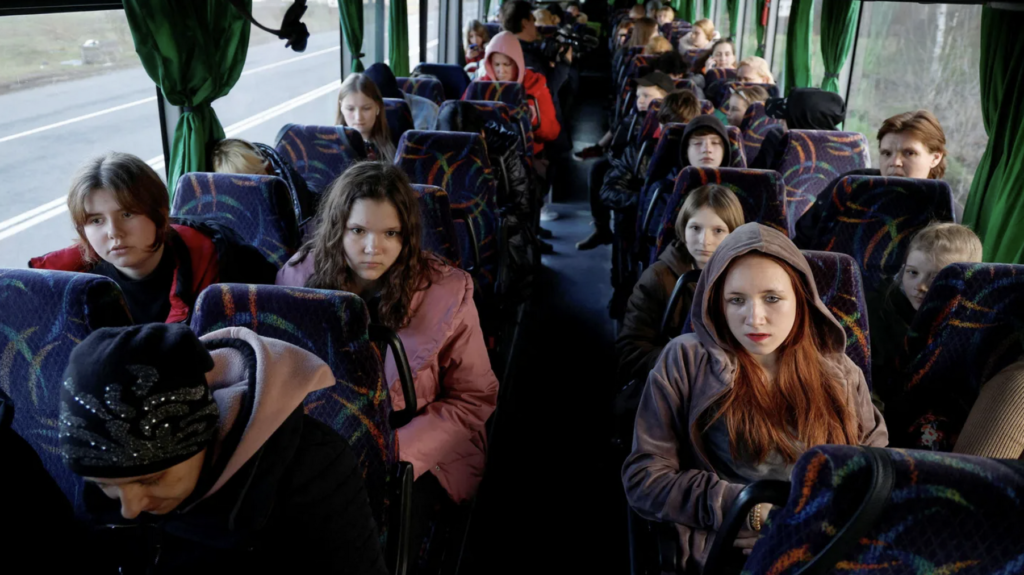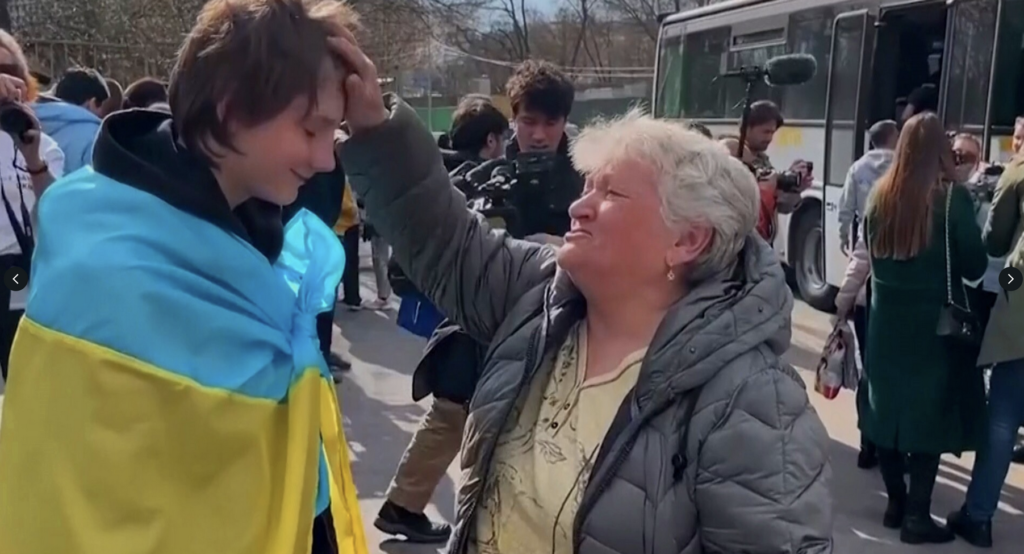
Taking Ukrainian children to “Re-education” camps in Russia is part of Vladimir Putin’s mission to eradicate Ukrainian identity.
According to the Russian state propaganda, among the main purposes of the Russian war with Ukraine are denazification and demilitarization of the country.
Russian propaganda considers Ukrainians who think that they are different from Russians – having their own language, nationality and are deserving a state of their own – enemies and often call these Ukrainians “Nazis.”
Until recently, Zaporizhzhia region was considered by many as one of the most typical, if not symbolic areas of Ukrainian people locality. It is this area, where Gogol’s “Taras Bulba”’s events took place – the quintessential story defining Ukrainian nationality.
Zaporizhzhia region was annexed by Russia during this war together with Kherson Oblast, Luhansk and Donetsk People’s Republics in the fall of 2022. The capital of the region, the city of Zaporizhzhia, was not captured and is under Ukrainian control.
Wikipedia:
“In September, occupation forces held largely disputed referendums in the occupied areas of Zaporizhzhia and Kherson Oblast to join the Russian Federation. On September 27, Russian officials claimed that Zaporizhzhia region’s referendum passed with 93.11% of voters in favor of joining the Russian Federation.”
It is difficult to believe the figure 93.11%. In fact even some publications in Russian media contradict this figure.
Occupational governor of Zaporizhzhya region Yevhen Balitsky said in an interview with journalist Nadana Friedrichson:
“We still have million-strong cities ahead of us, Zaporizhzhya is almost a million-strong city: how many people are there who doubt, hesitate? This is a very difficult question. If we act harshly, who will live and work on this land?”
According to Balitsky, the occupants “acted harshly” (arrested, executed) only towards those who cooperated with the Ukrainian Army. Those civilians who just did not want to become Russians, but wanted to remain Ukrainians were treated “humanely” by the occupants. Balitsky discribed the “humane” actions of the occupation authorities:
“We evicted a large number of families. It was very difficult to do. We evicted those who in one way or another did not support our war, those who insulted the Russian flag, the Russian anthem, the president of the Russian Federation. We took advantage of the position we had at that time, before the referendum, while we had not yet legally joined the Russian Federation. We evicted such people. Entire families.“
According to the governor, the occupation authorities of the region realized that “these are people whose minds we cannot change.” He also believes that these people could have been killed by their neighbors, loyal to Russians, as “at the first stages of the special operation there were facts when people committed vigilante justice.”
“We had to put these people, these families – and these were big families – somewhere, so we gave them the opportunity to leave.
“Some were forcibly evicted – we brought the families to the border strip, read out the decision on eviction, gave them a water bottle in their hands and threw them out. What to do with a woman with three children? She has a different belief. She doesn’t consider Russia her homeland. She doesn’t think what’s happening is right. What are we supposed to do, kill her? It’s clear that we were just pushing them out.”
The Russian occupants were pushing adult Ukrainians who didn’t want to become Russians off the occupied territories. As for Ukrainian children, occupants were known to try to take them deep into Russia, hoping to turn them into Russians.
The Ukrainian website Vesti–ua.net reports:
“According to the latest data, the occupants took about 210,000 Ukrainian children to Russia.
“The Russian Federation will grant citizenship to Ukrainian orphans and incapable persons in a simplified procedure. This is stated in the decree of Russian President Vladimir Putin. According to the decree, orphans and children left without parental care, as well as incapable persons who are citizens of Ukraine, can be granted citizenship of the Russian Federation in a simplified procedure.”
Russian independent website Meduza.io reports:
“Russian officials persuade Ukrainians to forget about their homeland – and convince them that their parents are either dead or have forgotten about them and will never come to take them home. The authorities are confident they can ‘re-educate’ the stolen children.”
To find out how this system works, Meduza.io’s special correspondent Liliya Yapparova studied thousands of documents and spoke with officials from the Russian Ministry of Education, the main agency responsible for the “indoctrination” of Ukrainian children.
The Russian Ministry of Education has sent a number of instructions to the country’s schools, including the instruction “Methodological Recommendations: Psychological Peculiarities of Minors Who Changed their Country of Residence and Techniques of Assertive Behavior of Pedagogical Workers.”
The Methodological Recommendations, according to Meduza.io, instruct teachers on how to remove elements of hostile ideology from children. They does not, however, describe this ideology in detail. But they emphasize that the children were allegedly “influenced” by it, simply because they lived on the territory of Ukraine.
According to Meduza.io, Russian teachers are faced with the task of “reorienting the younger generation of the Donetsk and Luhansk People’s Republics, Zaporizhzhya and Kherson regions to the Russian identity”. The instructions also give examples of such “reorientation.” For example, they describe a schoolgirl from Zaporizhzhya who published a “video of trampling the Russian flag with anti-Russian comments” on social networks and immediately became the subject of a criminal case. It is possible to prevent such “destructive manifestations” in Ukrainian children at the earliest stages, the Russian ministry said, first of all, right after the children were taken out of Ukraine. According to the specially developed methodological recommendations “adolescents arriving from war zones” may show “protest”, “capriciousness”, “distrust of adults”, aggressive behavior, express “ideas of personal superiority” – and in general “have difficulties in looking at emerging situations with the eyes of an observer.” Teachers should help such a child, who, according to the Russian government, is already deficient in “knowledge” and “social skills” that are “by default present in children in Russian space.” The methodological instruction states: “If you know that a child has family members killed or missing in the war, [in your communication with the child] emphasize not the people, but the events…” Don’t say “it’s nothing terrible,” “don’t worry, they are in a better place,” “they are on a cloud looking at you.”
“Talk honestly with the children about the fact that their loved ones have died or their home has been destroyed….. Directly say they’re dead. Give the child a chance to experience emotions. For example, if he is angry, let him tear up the paper.”
In the end, the schoolchild should feel “a sense of pride for his country, patriotism, a sense of belonging to the country.”
The recommendations do not specify what kind of country they should be proud of. The methodology instructions of the Ministry of Education of the Russian Federation describe the war – the only reason why children ended up in Russia – as follows: “complication of the geopolitical situation … prompting families … to be forced to relocate.” “Re-educating” Ukrainian children “on the basis of spiritual and moral values, historical and national-cultural traditions of the Russian Federation” is supposed to take place until graduation. As a result, teenagers should “form a Russian identity.”
Meduza.io concludes:
“Since the full-scale war began, Russian schools teach about the need to ‘disarm’ Ukraine, form ‘Russian civic identity’ and prepare for ‘serving the Motherland.’ As a result Russian teachers working with Ukrainians who have found themselves on Russian territory note that many Russian schoolchildren, under the influence of propaganda, are in principle not ready to communicate normally with Ukrainians – despite all the Kremlin’s ‘indoctrination’ programs.
“‘One boy went to our school and said: ‘I am a citizen of Ukraine – and I am proud of it.’ He was beaten up and never went to school again,’ says a volunteer who asked Meduza for anonymity. – Another boy (from Mariupol, he and his mother had barely managed to survive and escape) went to a Russian school and they called him a ‘khokhol’ (Russian slang dirty word for Ukrainian). The boy tolerated it until those who started the harassment got together and beat him very badly. The class teacher spread out her hands, and the parents of his classmates said: ‘Why did you come here in the first place? Nobody called you.’ And he never went to school again.”


